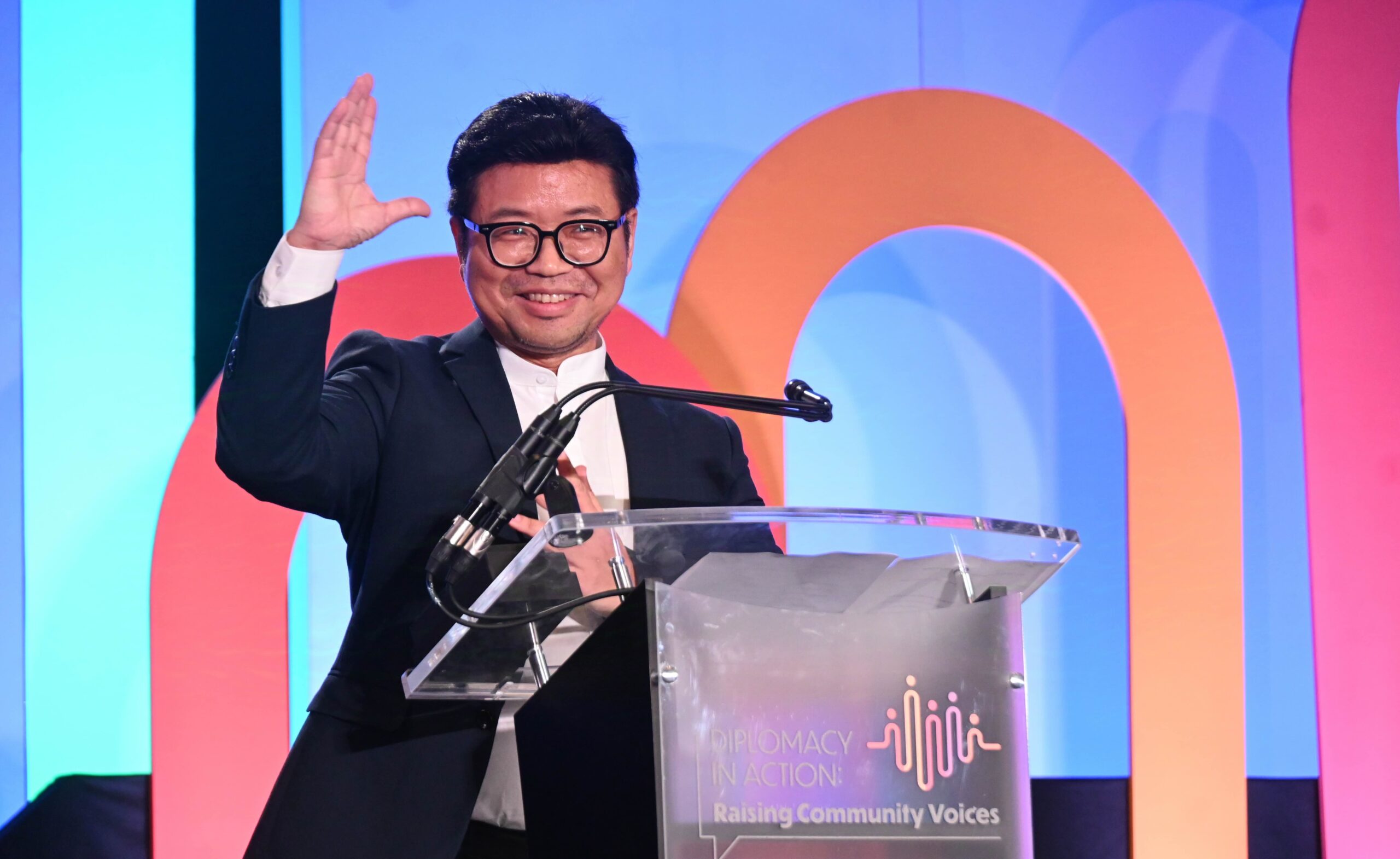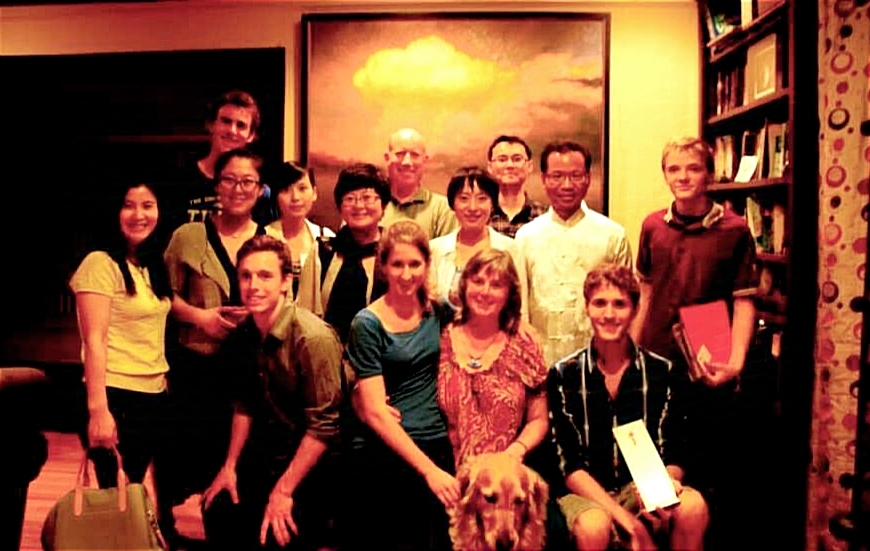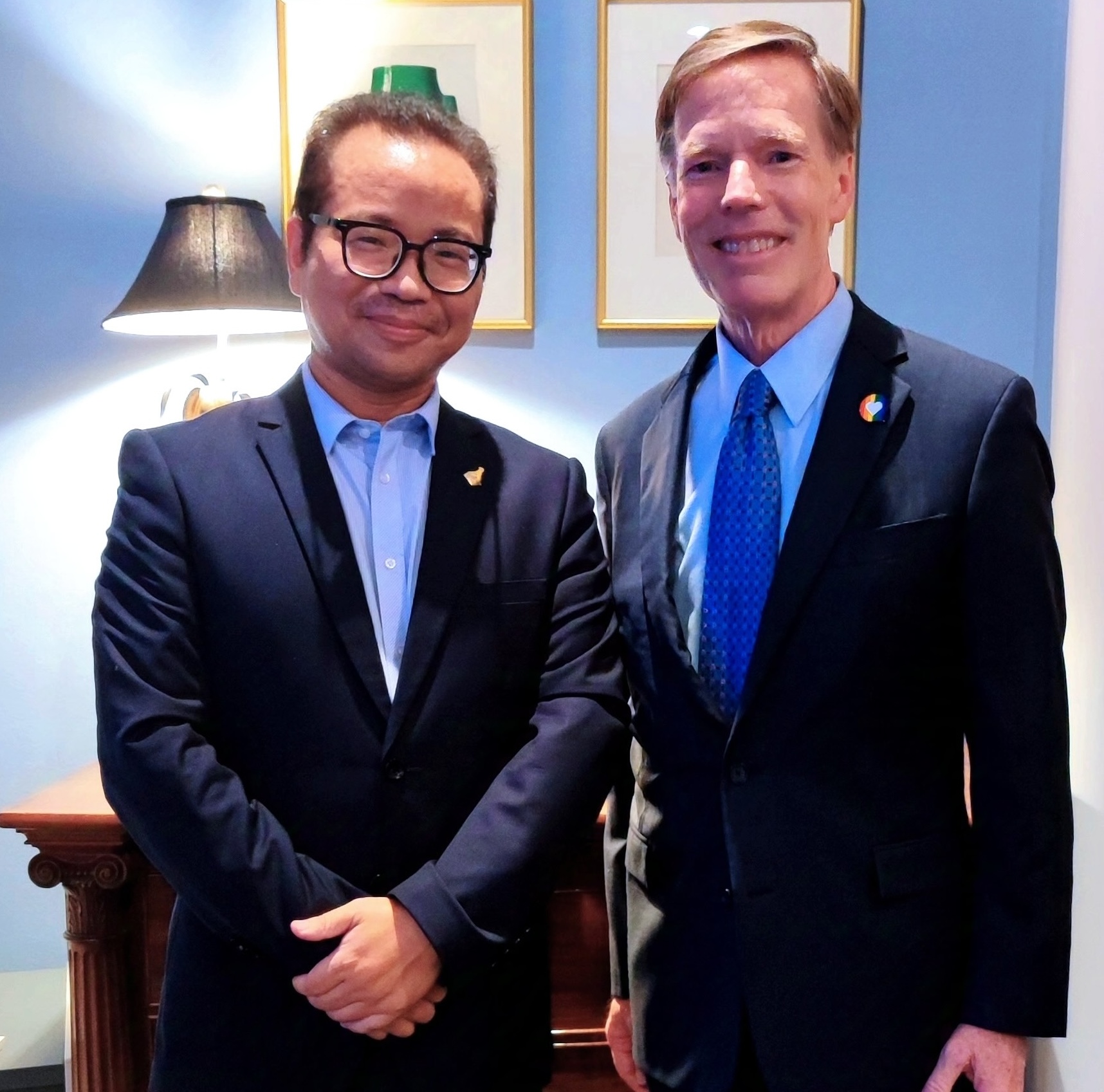
Zheng Qing Qu on stage at the 2024 National Meeting. All photos provided by author.
Zheng Qing Qu is a journalist, podcast host, and radio producer who participated in the International Visitor Leadership Program (IVLP) in 2013. He received the 2024 Global Ties U.S. IVLP Alumni Award for Social Innovation and Change for his work to empower youth through civic and community engagement. We spoke with Zheng Qing about the role of public diplomacy, new media, and volunteerism as platforms for youth in China to gain a better understanding of world around them.
Zheng Qing’s 2013 IVLP “Journalistic Practices in the U.S.” was programmed by FHI 360 (Washington, DC) in coordination with Gulf Coast Diplomacy (Pensacola FL), Tulsa Global Alliance (Tulsa, OK) and World Affairs Council – Seattle (Seattle, WA).
During your 2024 National Meeting keynote address, you shared that your IVLP shaped your career path. Was there a specific engagement or series of engagements that impacted you as a professional?
In 2013, the IVLP took me to Seattle, Tulsa, Pensacola, New York City, and Washington, DC, where I met with media, government, NGOs, and regular Americans. The trip broadened my horizons and reshaped my career path in unexpected ways.
Because I am a media professional, I am very focused on the profound changes taking place in American media. During the trip, I was deeply impressed by the digital transformation of print media, the close cooperation between national and local media; the unique perspectives of ethnic minority journalists in remote towns; the Sunshine Act promoting government transparency; the large number of independent media organizations; and the application of new media technology and concepts that combine real-time audio, video, and still images in transformative multimedia products. I felt at that time that the changes occurring in these media may also be the challenges that China will face in the coming years.
My IVLP experience drove home the importance of cross-cultural communication and exchange, and the urgency of transforming traditional media into new media, inspiring me to create the first public diplomacy new media in China, “Voice of Diplomacy” in 2014. It has since become a preferred program for foreign missions, international organizations, and influential figures at Chinese universities.

Zheng Qing Qu (middle row, second from right) with his home hospitality group during his 2013 IVLP.
Even before your IVLP exchange, you started the “Study Abroad Express” radio program. What motivated you to start that initiative?
About 15 years ago, when I was working at Beijing Radio, I founded China’s first study abroad radio program, “Study Abroad Express.” At that time, it was the peak of Chinese students studying abroad, and the United States was their first choice. I thought that if I told them the latest and most professional study abroad information and application channels, and provided professional consultation and guidance, it would help them better achieve their dreams.
I have invited officials from the U.S. Embassy and the American Center many times to live broadcasts on Beijing Radio to answer questions, and inform Chinese audiences of the latest visa policies, school enrollment policies, etc. There are also officials from other countries such as Australia, Canada, the United Kingdom, New Zealand, etc. We have helped thousands of people study in the United States.
How did participating in the IVLP change how you work with Chinese youth using public diplomacy and volunteerism?
In the United States, I had the special experience of distributing food to homeless people. When I personally delivered the food to the homeless people and they said thank you, I was touched. The local volunteers persist in doing this very meaningful work all year round, and I was deeply moved by them. At that time in China, the culture of long-term volunteer service was not yet common, and few young volunteers participated.
Since I founded the “Voice of Diplomacy,” I have regarded volunteering as an important part of my work. Most of my fans are young people. I have provided them with the opportunity to volunteer on my platform; to provide children in remote areas with practical opportunities to become future diplomats; to provide college students with the opportunity and guidance to enter international organizations for internships and work, as well as scholarships; and to donate money to earthquake stricken areas in Türkiye (Turkey) and Syria through the platform of the “Voice of Diplomacy.” Many of my fans, especially some young fans, have been involved in the volunteer service opportunities we provide year-round and have formed the habit of volunteering.
You work on a wide variety of public diplomacy pillars – education and literature, sports, cuisine, and volunteerism – which are sometimes referred to as “soft power.” How do you measure the success of your initiatives?
I believe that the most important significance of public diplomacy lies in connecting people from different cultural backgrounds, allowing for easy communication, especially in today’s complex and ever-changing international situation with constant wars. Through these cultural exchanges, misunderstandings and biases can be eliminated, and communication and development can be promoted.
For example, in our special initiative “Poetic Spring Greetings from Ambassadors” for the Spring Festival, I have interviewed over 100 ambassadors from various countries to China for 8 consecutive years. This year, I invited U.S. Ambassador Burns to greet the Chinese New Year and read a hopeful poem by the famous U.S. poet Maya Angelou.

Zheng Qing Qu (left) with U.S. Ambassador to China Nicholas Burns.
The ambassador’s reading was sincere, fluent, and beautiful, touching many Chinese friends. It has been viewed more than 1.1 million times on various media platforms in China, and the official account of the embassy has also reposted it, and 99% of the comments were positive and friendly. Chinese friends thanked the ambassador for his blessings and sharing, praising the charm and power of poetry. Especially after the pandemic, as China and the United States begin to increase cultural exchanges, people need this hope and strength.
I think this may be the significance of my public diplomacy, which is to connect people through shared human emotions and promote mutual understanding, benefiting both parties.
You have already started several initiatives to promote people-to-people connections in China with Voice of Diplomacy, Future Diplomats, and the Taiji Salon for Global Diplomats, to name a few. What is next for you?
I have many plans!
I hope to bring “Future Diplomats” participants to visit and ultimately study abroad in the United States; to launch an “Intangible Cultural Heritage Protection Plan” and a “Hope Music Plan,” to name a few, to help more young people from remote areas [of China] step onto a bigger stage.
I hope to have the opportunity to exchange more ideas in the future, and to achieve this wish, we need to work together even harder.
